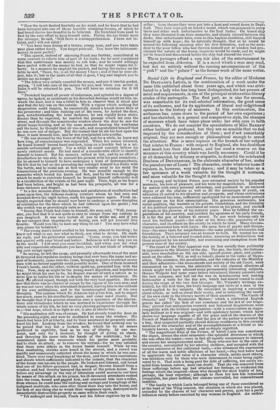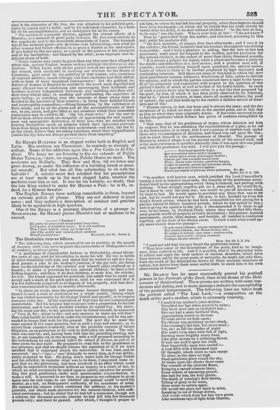Social Life in England and France, by the editor of
Madame Du DEFFAND'S Letters, is the continuation of a work under the same title published about three years ago, and which was attri- buted to a lady who has long been distinguished, for her powers of mind and acquirements, in one of the principal aristocratico-literary circles of the metropolis. The first part, as is also the second, was remarkable for its well-selected information, the good sense of its authoress, and for its application of liberal and enlightened opinions to the history of manners. In this continuation, the authoress has come down to the period of her own experience ; and has sketched, in a general and comparative style, the changes of manners which have taken place under her own eyes in both countries. We do not consider the speculations of Miss BERREY either brilliant or profound, but they are so sensible that we feel improved by the consideration of them ; and if not remarkably original, they are new enough or philosophical enough to arrest the attention. She is more copious on the branch of her subject that relates to France : with respect to England, she has doubtless said much less than she knows, and has used a reserve on the manners of this country which was hardly necessary. Could it be at all demanded, by delicacy or etiquette, to describe the celebrated Duchess of DEVONSHIRE, in the elaborate character of her, under the pseudonyme of Lucia ? The character, under whatever name it rejoices, is, however, very well drawn ; and it may be taken as a fair specimen of a work valuable for the thought it contains, and more valuable for the thought it excites.
"A young and brilliant Prince now animated society by his popular manners, his love of pleasure, and his taste for magnificence. Endowed by nature with every personal advantage, and possessed in an eminent degree of all the charms as well as all the advantages of youth, an education ill-suited to his situation and prospects, and whose restrictions were enforced too long, sufficiently apologized for an immoderate pursuit
Of pleasure on his first emancipation. His generous sentiments, his social qualities, the warmth of his private friendships, and the liberality of his political opinions, conciliated all voices in his praise, and excited all hopes in the promise of his maturer years. How he fulfilled the ex- pectations of his country, and justified the opinions of his early friends, it is for the pen of history to record. To our work belongs only to recal his brilliant youth—the eclat of his fetes—the popularity of his character, and its effects on the society in which he lived. Many circum- stances associated him with Lucia : the same love of gayety and dissipa- tion—the same taste for magnificence—the same political sentiments and friendships. Their intimacy was an honour to both. He treated her on the footing of a beloved and trusted sister, assuming no distinctions but those acquired by his amiability; nor exercising any exemption from the general tone of her society. "The court of the Heir Apparent was no less socially than politically in opposition to the Ministry of the day. The gay, the lively, the fashion- able, were marshalled on the one side, against power, place, and prefer- ment on the other. Wit, as well as beauty, shone in the ranks of Oppo- sition. The mistakes, the peculiarities, and the ridicules of the Ministry and their adherents—the amusements and society of the old Court, were commented on in verses, the admirable wit and classical allusions a which might well have adorned more permanently interesting subjects. Horace Walpole had some years before introduced literary pursuits into the best company, and had led the way in familiarizing and making fashionable a taste for the fine arts, which had almost ceased to exist during the reign of the two first Georges. Mr. Walpole's writings ex- hibited, for the first time, the lively language and views of a man of the world applied to dry subjects. He succeeded in inspiring a curiosity about artists, as well as about their works, and in interesting the vanity of his own caste in the literary merits of their ancestors. The Castle of Otranto,' and The Mysterious Mother,' which a celebrated English genius has called the first of our romances and the last of our trage- dies,' proved that antiquarian research and historical disquisitions were compatible with the liveliest imagination—with a conversation as singu- larly brilliant as it was original—and with epistolary talents which have shown-our language capable of all the grace and all the charms of the French of Madame de Sevigne".—But the pen of the author is arrested by a fear, that suspected partiality should destroy confidence in this cursory mention of the character and of the accomplishments of a friend so in. timately known, so highly valued, and so deeply regretted. "The magnificent fetes of the Prince, of which Lucia was sometimes the object, always the chief ornament—the splendid diversions in which she was often the leader—were in fact all equally unnecessary to interest and amuse her unsophisticated mind. Those who saw her in the calm of the country, surrounded by her adoring children, and occupied with the various resources of her cultivated taste,—who witnessed the expression of all the warm and noble affections of her heart,—they best knew how to appreciate the real value of a character which, unlike most others, was mistaken only by those who were determined to resist being capti- vated by it. That such a being paid the debt of suffering, too surely ex- acted from human nature, none can doubt. That she was removed from these sufferings before age had attacked her feelings, or weakened the feelings which she inspired—those who thought the most highly of her, perhaps, the least regretted ; although to them her loss has remained irreparable, her place unfilled, her charms unrivalled, her remembrance indelible.
"The family to which Lucia belonged being one of those considered as at the head of the Whig interest, the situation in which she was placed, seconded by the charms of her character and person, gave her a party influence rarely before exercised by any woman in England. An enthu- siast in the character of Mr. Fox, she was attached to his political prin- ciples by reason and hy habit ; and to his individual character, by a taste for all his accomplishments, and an indulgence for all his errors. "The success of a popular election, against the utmost efforts of a Ministry, in a moment of great party violence, Mr. Fox owed entirely to the popularity and to the irresistible attractions of Lucia. The triumph was at the moment great—was decisive—was intoxicating—was what no other woman had before effected on so great a theatre as the metropolis. It was hailed by the one party, as a proof of the powers of her character ana of her fascination; and blamed by the other, as an improper and in- delicate abuse of both.
"Better reasons may surely be given than any that were then alleged on either side, against English women seeking. political interference or dis- tinction. When Lucia, with all her powers and all her means exerted to the utmost, only succeeded in carrying one election for the House of Commons, poor must be the ambition of that woman, who, conscious of superior abilities, would willingly risk their exertions and their defeat, with no hope of more important consequences ! Let the political in- fluence of women in England be exerted in the much more dignified and more efficient line of confirming .and encouraging their husbands and brothers in every independent sentiment, and instilling into their chil- dren every liberal idea; in soothing and obliterating the asperities of party feeling ; in watching over the interests of those whose time is devoted to the interests of their country ; in being their faithful friends and incorruptible counsellors,—fitting themselves, by the cultivation of their minds, and by all the graces and all the accomplishments of their sex, to aid, adorn, and give effect to any situation which their immediate connexions may be called to fill. 'The tibi erunt artes.' Let the rest be left to those whose minds are incapable of appreciating the real import. ance and appropriate distinction of their sex—who are satisfied with hearing themselves speak. on subjects which their ignorance prevents them from being aware how little they understand—and who, like the fly on the wheel, believe they are aiding exertions, which their insignificance (unlike the fly) does not always prevent them from impeding."



























 Previous page
Previous page